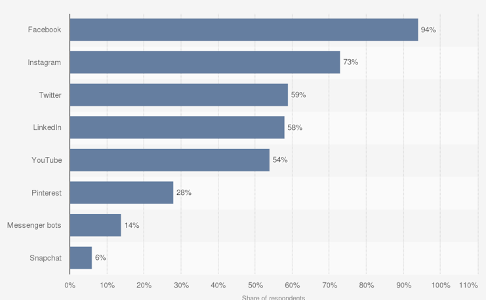
Is Social CRM an opportunity for brazilian SMEs?
A great number of these internet users is connected to social networks. The most accessed platforms in the world are respectively Facebook, YouTube, WhatsApp, Facebook Messenger, WeChat, and Instagram. In 2018, Facebook reached the mark of 2.27 billion users worldwide and 127 million only in Brazil, the fifth-largest market of the company. The constant growth of these platforms provided new ways for companies to communicate with consumers and strengthen the relationship with their existing customers. Following this trend, Facebook is the most used platform by Brazilian companies, followed by Instagram (Figure 1).
Figure 1 - Leading social media platforms used by marketers worldwide as of January 2019[1]
In Brazil, there are 6.4 million companies, of which 99% are Small and Medium Enterprises (SMEs).[2] SMEs in Brazil, as in many other countries, are responsible for generating the majority of job positions and the massive growth of such companies in Brazil is partly attributed to the legislative reforms in the Brazilian business ecosystem. The Law 123/2006 granted the SMEs a differentiated treatment, providing further development of these companies, positively impacting on factors such as competitiveness and survival rate.[3]
The growing number of SMEs combined with the growing number of social media users brought new opportunities for company-customer interactions. In Brazil, around 96,2% of the companies established their presence in social networks and most of them stated that social platforms have a positive impact in their businesses. Among these companies 70,5% indicated that an increase in online visibility was the main reason for being present in social media (Figure 2). According to a study from De Sousa et al. (2018), although a great majority of Brazilian companies use social media to increase their visibility in these networks, only a few (6.7%) uses them as channels for selling their products and services.[4]
Figure 2 - Presence of companies in social networks and reasons for using social networks[5]
However, from the demand side, a study published by PWC indicates that consumers are influenced by social networks in the buying situation, whether by comments, likes, or direct interactions with companies of different sizes. The findings also indicate a significant deficiency in the use of social networks by SMEs, with vast untapped potential.
Faced with this new environment and the active role of consumers in the online relationship with the company, Social CRM provides a solution on how to “integrate traditional strategies of Customer Relationship Management with tools able to retrieve, store, and analyze information collected from social networks”[6]. Social CRM derives from the application of social media technologies in the field of CRM, supporting marketing, sales and service processes through social media[7].
This indicates an opportunity at hand for Brazilian SMEs. There is a low degree of utilization of Social CRM resources, especially as channels for product sales. Brazil is a market still in development regarding the application of SCRM techniques that can leverage competitiveness, particularly of SMEs. Is your company ready for these new opportunities of building customer relationship?
[1] Statista (2019). Redes Sociais Mais Acessadas no Mundo. Website: https://bit.ly/2QGQfc0. Acessed on: 09.11.2019.
[2] Sebrae (2018). Panorama dos Pequenos Negócios 2018. Website: https://bit.ly/2D7DE9R. Acessed on: 02.11.2019.
[3] Lei no 123 de 14 de dezembro (2006, 14th of December). Institui o Estatuto Nacional da Microempresa e da Empresa de Pequeno Porte. Website: https://bit.ly/2D7DMGn. Acessed on: 09.11.2019.
[4] De Sousa, G. N., Huppes, L. V., Jacob Jr, A. F. L., & Lobato, F. M. F. (2018). Adoção de Social CRM em Micro e Pequenas Empresas: Uma Análise do Mercado Santareno. arXiv preprint arXiv:1811.11821.
[5] Social Media Trends (2019). Panorama das Redes Sociais no Brasil. Website: bit.ly/2qF6age. Acessed on: 09.11.2019.
[6] Chiaradia, L. F. C., Macedo, D. D. J. D., & Dutra, M. L. (2017). Proposta de Arquitetura de Microsserviços para um Sistema de CRM Social.
[7] Alt, R., Reinhold, O. (2018). Social Customer Relationship Management: Fundamentals, Applications and Technologies. Spring Glober. Leipzig: Germany.
Translated into English by Julio Viana.




